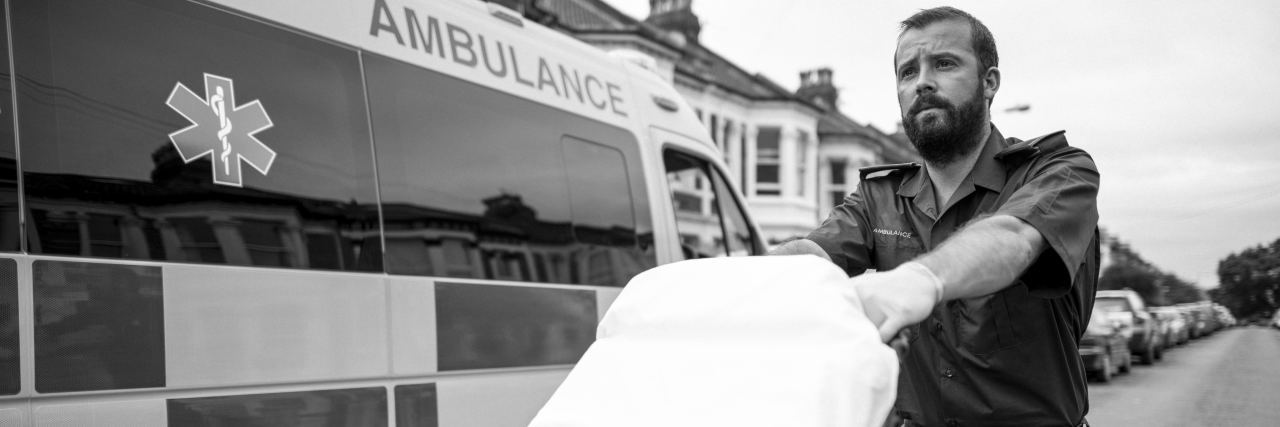To Paramedics Caring for People With Chronic Pain Who Are Afraid of Hospitals
I have never been someone who takes going to A&E (or the emergency room) lightly. Before my chronic pain I was someone who absolutely would refuse outright to go even when I most likely should. I remember one occasion my face changed to a sickly green color after days of severe pain after I tore a rotatory cuff, and still it took family pushing me for me to agree to go get help. Ever since I was a small child I have had a phobia of hospitals and a distrust of doctors and nurses. Over the course of my illness, through many dramatic situations, that trust was built up and torn right back down again to the point where it actually worsened my phobia and I developed post-traumatic stress in regards to hospitals. Many others with chronic pain have similar experiences to mine and share my fears. It’s scarily common, in fact.
After my trauma worsened my relationship with hospitals I had one bout of pain, one of my worst. I tried to take a nap and see if I would wake up in a better situation, but that didn’t work. Morphine, paracetamol, ibuprofen, nerve blockers, heat packs — I tried everything. I was so scared of going in, but I was in so much pain I could barely see straight. Once I was at a point where I was struggling not to scream I decided to call a non-emergency number, hoping for some magical advice to end my pain without having to go to a hospital. The operator was concerned by the pain in my voice so they sent an ambulance. I was terrified.
When the ambulance arrived they tried to stabilize me with little success. I grew more and more ill and my symptoms as well as my pain grew to a concerning point. My condition deteriorated and I heard one of them say they would have to take me in and I honestly just lost it. I remember very little of what happened that night but I remember begging them not to. I pleaded and cried and said I couldn’t take it, that I wouldn’t go in, and even childishly shouted that they couldn’t make me. I was in a complete fight or flight situation and just wanted to get away, but had no energy to do so.
Luckily for me I was blessed enough that the first responders sent to me weren’t as cruel or negligent as the ones who caused my trauma. One of them sat down with me on the floor and asked why I was so scared. I cried and explained what had happened before. It was hard to get out anything resembling a full sentence but she understood. She smiled and looked at me and said wait here just a second, and “If you are going to be sick again, just don’t get it on my shoes, yeah?” in an attempt to make me smile.
A minute later I had a younger trainee paramedic next to me. She talked to me and sat with me for a while and tried to calm me down and get me to agree to come to the hospital. She wasn’t pushy and she didn’t use any scare tactics regarding my health. She just tried to explain that they wouldn’t let me get hurt again, that they would make arrangements to keep me safe and to help me manage the pain. She reminded me of how kind paramedics could be and of others who had helped me in the past. Even on the day I developed my trauma, I had two wonderful paramedics who made me smile and laugh, and to this day they are the silver lining in that memory that helps to keep me going.
As long as I was in their care I felt safe, and I felt respected as a person. In situations of flare ups with chronic pain conditions it can get pretty scary pretty fast. When pain is the norm, it can be terrifying when that pain gets out of hand. We are so used to managing it and keeping that pain under control that when it gets out of control, its our worst fear realized. When we meet a first responder we never know if they are going to help us, be rude, or even make things worse. It’s a scary situation with our health as it is, so the idea of going to A&E can be unthinkable to some of us. It’s never an easy choice to make. But when the first people we interact with are respectful and kind, it can make the whole experience bearable.
So to any paramedics or first responders reading this, I and others with chronic pain know you work long hours. We know your job is hard and we aren’t always the easiest patients to deal with and may be a very difficult part of your day, but please be patient. You never know how others have treated us or how it has affected us long-term. But what you can always know is that if you are kind, you can make a terrifying situation feel easier and nicer. You may not be able to do much about the pain, but you can always help us mentally. You can even help change our mental health long-term by just being nice. An interaction that might just be part of your normal day, something you will likely forget after a few days, can be life changing for us. So please be kind.
If paramedics Sam and Mario ever read this — thank you for everything. I don’t think I would be here without you and your kindness. I was in unimaginable pain and you made me laugh and smile. I will never forget you.
Photo by rawpixel via Unsplash

